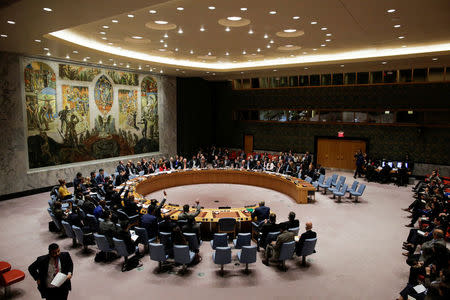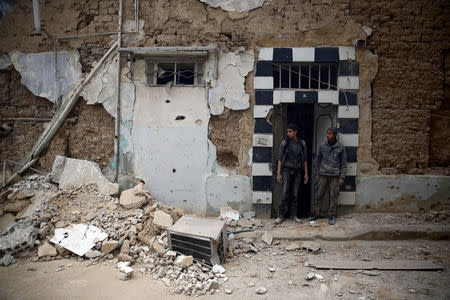U.N. Security Council demands truce as air strikes batter Syria's Ghouta
By Ellen Francis and Michelle Nichols
BEIRUT/UNITED NATIONS (Reuters) - The U.N. Security Council on Saturday demanded a 30-day truce across Syria as rescuers in the country's eastern Ghouta region said bombing had not let up long enough for them to count bodies during one of the bloodiest air assaults of the seven-year war.
Shortly after the unanimous vote by the 15-member council, warplanes struck a town in eastern Ghouta, the last rebel enclave near Syria's capital, an emergency service and a war monitoring group said. Warplanes have pounded the region for seven straight days while residents holed up in basements.
U.N. chief Antonio Guterres appealed on Wednesday for an immediate end to "war activities" in eastern Ghouta, where nearly 400,000 people have lived under government siege since 2013, without enough food or medicine.
While Syrian ally Russia supported the adoption of the U.N. resolution, Russian U.N. Ambassador Vassily Nebenzia cast doubt on its feasibility. Previous ceasefire deals on the ground have had a poor record of ending fighting in Syria, where President Bashar al-Assad's military has gained the upper hand.
"What is necessary is for the demands of the Security Council to be underpinned by concrete on the ground agreements," Nebenzia told the council after the vote. He later told reporters it was unrealistic to expect an immediate ceasefire and that the parties had to be encouraged to work for it.
After several days of delay and last-minute negotiations to win the support of Russia, the council adopted the resolution - drafted by Sweden and Kuwait - demanding hostilities cease for 30-days "without delay" to allow aid access and medical evacuations.
"We accept that it might take a number of hours before it can all be fully implemented ... we just have to keep the pressure up, implementation is key now," Swedish Foreign Minister Margot Wallstrom told Reuters.
Russia did not want to specify when a truce would start, so a proposal for the truce to begin 72 hours after adoption was watered-down to demand it start "without delay." Further talks on Saturday added a demand for all parties to "engage immediately to ensure full and comprehensive implementation."
"As they dragged out the negotiation, the bombs from Assad's fighter jets continued to fall. In the three days it took us to adopt this resolution, how many mothers lost their kids to the bombing and shelling?" U.S. Ambassador to the United Nations Nikki Haley told the council.
"We are deeply skeptical that the (Syrian) regime will comply," Haley said.
COMBATING TERRORISM
A surge of rocket fire, shelling and air strikes has killed more than 500 people since Sunday night, the Syrian Observatory for Human Rights said. The dead included more than 120 children.
The monitor said raids hit Douma, Zamalka and other towns there on Saturday, killing 40 people.
After the U.N. vote the two dominant rebel factions in Ghouta - Failaq al-Rahman and Jaish al-Islam - both committed to implement the truce and facilitate aid access, but also reiterated their right to respond to any attacks on them.
Medical charities have decried attacks on a dozen hospitals. The Syrian government and Russia say they only target militants. Moscow and Damascus have said they seek to stop mortar attacks injuring dozens in the capital, and have accused insurgents in Ghouta of holding people as human shields.
There was no immediate comment from the Syrian military.
"We're combating terrorism on our territories," Syrian U.N. Ambassador Bashar Ja'afari told the Security Council. "Our government will reserve the right to respond as it deems appropriate in case those terrorist arms groups are targeting civilians in any part of Syria with even one single missile."
Ja'afari said his government interpreted the resolution as also applying to "Turkish forces in Afrin, and the operations of the anti-ISIL (Islamic State) coalition in Syria ... Israeli forces in Syria, especially the occupied Syrian Golan."
The truce demanded by the Security Council does not cover militants from Islamic State, al-Qaeda, and the Nusra Front.
First responders searched for survivors after strikes on Kafr Batna, Douma and Harasta, the Civil Defence in eastern Ghouta said on Saturday. The rescue service, which operates in rebel territory, said it had documented at least 350 deaths in four days earlier this week.
"Maybe there are many more," said Siraj Mahmoud, a civil defence spokesman in the suburbs. "We weren't able to count the martyrs yesterday because the warplanes are touring the skies."
'BURIED UNDER HOUSES'
As the bombs rain down, workers have struggled to pull people from the rubble, Mahmoud said. "But if we have to go out running on our legs and dig with our hands to rescue the people, we will still be here."
A witness in Douma said he woke up in the early hours on Saturday to the sound of a squadron of jets bombing nearby. The streets have mostly remained empty.
The local opposition council said it was setting up emergency volunteer teams in several districts to reinforce shelters with sandbags and try to link them through tunnels.
Several previous ceasefire attempts have quickly unraveled during the multi-sided conflict, which has killed hundreds of thousands and forced 11 million people out of their homes.
Syrian state media said Ghouta factions fired mortars at districts of Damascus on Saturday, including near a school. Insurgent shelling wounded six people, it said, and the army heavily pounded militant targets in response.
The Ghouta pocket has become the war's latest flashpoint, after a string of rebel defeats and negotiated withdrawals. With Russian jets and Iran-backed militias, Assad's military has restored state rule over the main cities across western Syria.
Insurgents in eastern Ghouta have vowed not to accept such a fate, ruling out the kind of evacuation that ended rebellion in Aleppo and Homs after bitter sieges.
Russia has blamed Nusra fighters, from al-Qaeda's former Syria branch, for provoking the situation in Ghouta. The two main Islamist factions there in turn accuse their enemies of using the presence of a few hundred jihadist fighters as a pretext for attacks.
(Reporting by Ellen Francis, Dahlia Nehme and Michelle Nichols; Editing by William Maclean, Daniel Wallis and Chris Reese)



